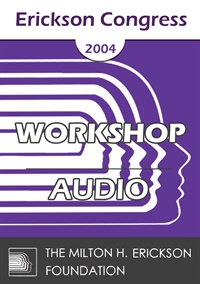
- Average Rating:
- Not yet rated
- Topic Areas:
- Workshops | Metaphors | Anxiety | Depression | Pain and Healing | Post-Traumatic Stress Disorder (PTSD)
- Categories:
- Erickson Congress | Erickson Congress 2004
- Faculty:
- Cheryl Bell-Gadsby, M.A., R.C.C. | Kathleen Donaghy
- Duration:
- 2:10:44
- Format:
- Audio Only
- Original Program Date:
- Dec 04, 2004
- Short Description:
- Metaphor, energetic bodywork, imagery and hypnotic techniques share a powerful complementary relationship. Our state of mind can dramatically influence our health and creative potential. This workshop will introduce participants to the human energy field and specific energy-based healing techniques which when combined with metaphor and imagery, can help replenish the mind and the body as well as manage a wide variety of symptoms including chronic pain, anxiety, depression and PTSD.
- Price:
- $15.00 - Base Price
Tags: Anxiety Metaphors Pain & Healing PTSD
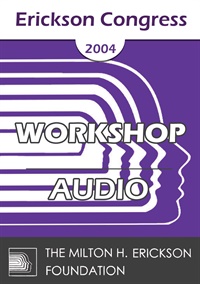
- Average Rating:
- Not yet rated
- Topic Areas:
- Workshops | Family Therapy | Post-Traumatic Stress Disorder (PTSD) | Hypnosis | Relationships | Somatic Experiences | Psychosomatics
- Categories:
- Erickson Congress | Erickson Congress 2004
- Faculty:
- Camillo Loriedo, MD, PhD | Maggie Phillips, PhD | Gunther Schmidt, MD, MA
- Duration:
- 1:55:17
- Format:
- Audio Only
- Original Program Date:
- Dec 05, 2004
- Short Description:
- Specific direct and indirect techniques are required to activate family resources and to induce a deep and meaningful change of the most rigid family patterns. A family hypnotic session reveals the powerful and subtle resistances a family may develop in the course of the hypnotic treatment as well as of the many different solutions a therapist may adopt to overcome these resistances. Special focus will be on how to properly combine direct and indirect in the different phases of the therapeutic process.
- Price:
- $15.00 - Base Price
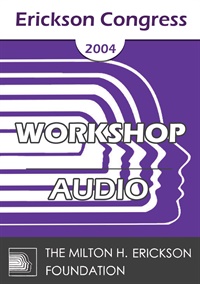
- Average Rating:
- Not yet rated
- Topic Areas:
- Workshops | Post-Traumatic Stress Disorder (PTSD)
- Categories:
- Erickson Congress | Erickson Congress 2004
- Faculty:
- John Beahrs, MD
- Duration:
- 1:45:49
- Format:
- Audio Only
- Original Program Date:
- Dec 05, 2004
- Short Description:
- Treating post-traumatic disordered patients requires multi-level communication; overt contracting and informed consent, plus covert suggestion implying greater competency than patients experience. Key issues are role differentiation, establishing safety parameters, neutralizing regressive invitations, working with significant others, and challenging patients to master their trauma through redefining their personal identity.
- Price:
- $15.00 - Base Price
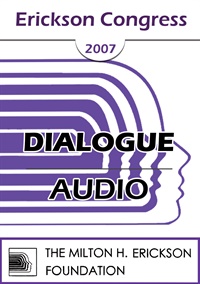
- Average Rating:
- Not yet rated
- Topic Areas:
- Dialogues | Post-Traumatic Stress Disorder (PTSD)
- Categories:
- Erickson Congress | Erickson Congress 2007
- Faculty:
- Yvonne Dolan, MA | John Frykman, MDiv, PhD
- Duration:
- 56:22
- Format:
- Audio Only
- Original Program Date:
- Dec 08, 2007
- Short Description:
- IC07 Dialogue 12 - PTSD - Yvonne Dolan, M.A., John Frykman, PhD
- Price:
- $15.00 - Base Price
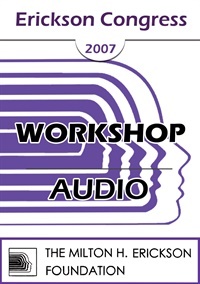
- Average Rating:
- Not yet rated
- Topic Areas:
- Workshops | Ericksonian Hypnosis and Therapy Techniques | Hypnotherapy | Post-Traumatic Stress Disorder (PTSD)
- Categories:
- Erickson Congress | Erickson Congress 2007
- Faculty:
- Jorge Abia, MD
- Duration:
- 1:21:24
- Format:
- Audio Only
- Original Program Date:
- Dec 07, 2007
- Short Description:
- PTSD is a clinical problem that may be a covert cause of hypnotherapy failure. Paradoxically, hypnotherapy has been proven useful for treatment, even prior to the formal description of diagnosis. The main features and case results of this program, which has been successfully applied in clinical research and practice, will be presented.
- Price:
- $15.00 - Base Price

- Average Rating:
- Not yet rated
- Topic Areas:
- Workshops | Children and Adolescent Therapy | Psychotherapy | Anxiety | Hypnosis | Post-Traumatic Stress Disorder (PTSD) | Self-Esteem
- Categories:
- Erickson Congress | Erickson Congress 2007
- Faculty:
- Susy Signer-Fischer, Lic. Phil. Psych
- Duration:
- 1:53:27
- Format:
- Audio Only
- Original Program Date:
- Dec 07, 2007
- Short Description:
- Self-esteem, self-confidence and self-concept are closely connected with the development of human identity. The enhancement of self-esteem and identity formation can be used effectively in psychotherapy with children, especially in the treatment of anxiety disorders, depression, post-traumatic stress disorder and many other social difficulties. Hypnotic interventions proved to be effective in working with children and adolescents on an individual basis.
- Price:
- $15.00 - Base Price
Tags: Anxiety Hypnosis PTSD Self-Esteem
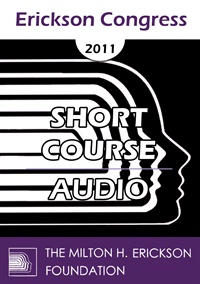
- Average Rating:
- Not yet rated
- Topic Areas:
- Consciousness | Short Courses | Anxiety | Depression | Post-Traumatic Stress Disorder (PTSD) | Therapist Development
- Categories:
- Erickson Congress | Erickson Congress 2011
- Faculty:
- Virgil Hayes, DO
- Duration:
- 1:08:15
- Format:
- Audio Only
- Original Program Date:
- Dec 09, 2011
- Short Description:
- Consciousness can be defined as increased awareness. Simply put it is, “seeing a bigger picture.” The more you understand yourself, the easier it is to understand other. AN individual’s consciousness is the “x” factor in therapeutic encounters. The short course with lecture and case discussions is useful to all skill levels. Non-pathological understandings and co-created solution for anxiety, depression, and PTSD are included in case discussions.
- Price:
- $15.00 - Base Price
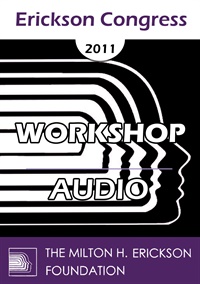
- Average Rating:
- Not yet rated
- Topic Areas:
- Psychotherapy | Grief | Workshops | Post-Traumatic Stress Disorder (PTSD) | Trauma
- Categories:
- Erickson Congress | Erickson Congress 2011
- Faculty:
- Woltemade Hartman, PhD
- Duration:
- 1 hour
- Format:
- Audio Only
- Original Program Date:
- Dec 07, 2011
- Short Description:
- Traditional intervention strategies to overcome traumatic grief reactions have in the past failed to achieve successful treatment outcomes. Dysregulation of affect and other central symptoms of acute stress disorder and PTSD are often the result of dissociative reactions to cope with the traumatic loss. This workshop will focus on grief as a resource, methods to facilitate the containment and transmutation of negative affect and how to integrate the deceased as an internal resource.
- Price:
- $20.00 - Base Price
Tags: Grief Psychotherapy PTSD Trauma
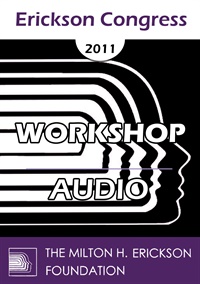
- Average Rating:
- Not yet rated
- Topic Areas:
- Trauma | Workshops | Memory | Buddhism | Psychotherapy | Post-Traumatic Stress Disorder (PTSD) | Trance
- Categories:
- Erickson Congress | Erickson Congress 2011
- Faculty:
- Ricardo Feix, MD
- Duration:
- 59 Minutes
- Format:
- Audio Only
- Original Program Date:
- Dec 07, 2011
- Short Description:
- Clinical case demonstrates an integrative approach of treating deep trauma. DTMR approximates east and west, old and new traditions. Utilizes concepts from occidental psychotherapy, transpersonal influ-ences and some about Kardecism, Buddhism and Xamanism. Through a deep trance, active, eclectic DTMR responds as a tool for patients with PTSD and dissociation.
- Price:
- $20.00 - Base Price
Tags: Buddhism Psychotherapy PTSD Trance Trauma
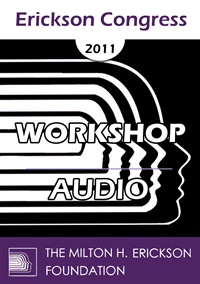
- Average Rating:
- Not yet rated
- Topic Areas:
- Post-Traumatic Stress Disorder (PTSD) | Workshops | Indirection | Trauma
- Categories:
- Erickson Congress | Erickson Congress 2011
- Faculty:
- Teresa Robles, MA, PhD
- Duration:
- 59 Minutes
- Format:
- Audio Only
- Original Program Date:
- Dec 07, 2011
- Short Description:
- We are living times of natural disasters, violence, wars. The number of people affected by PTSD is in-creasing. After a brief theoretical introduction, Dr. Robles will propose a model for working with persons suffering PTSD, in an indirect way, without provoking catharsis. After, she will demonstrate two techniques. Before the end, we will have time for reflections and discussing.
- Price:
- $20.00 - Base Price
Tags: Indirection PTSD Trauma
Please wait ...

